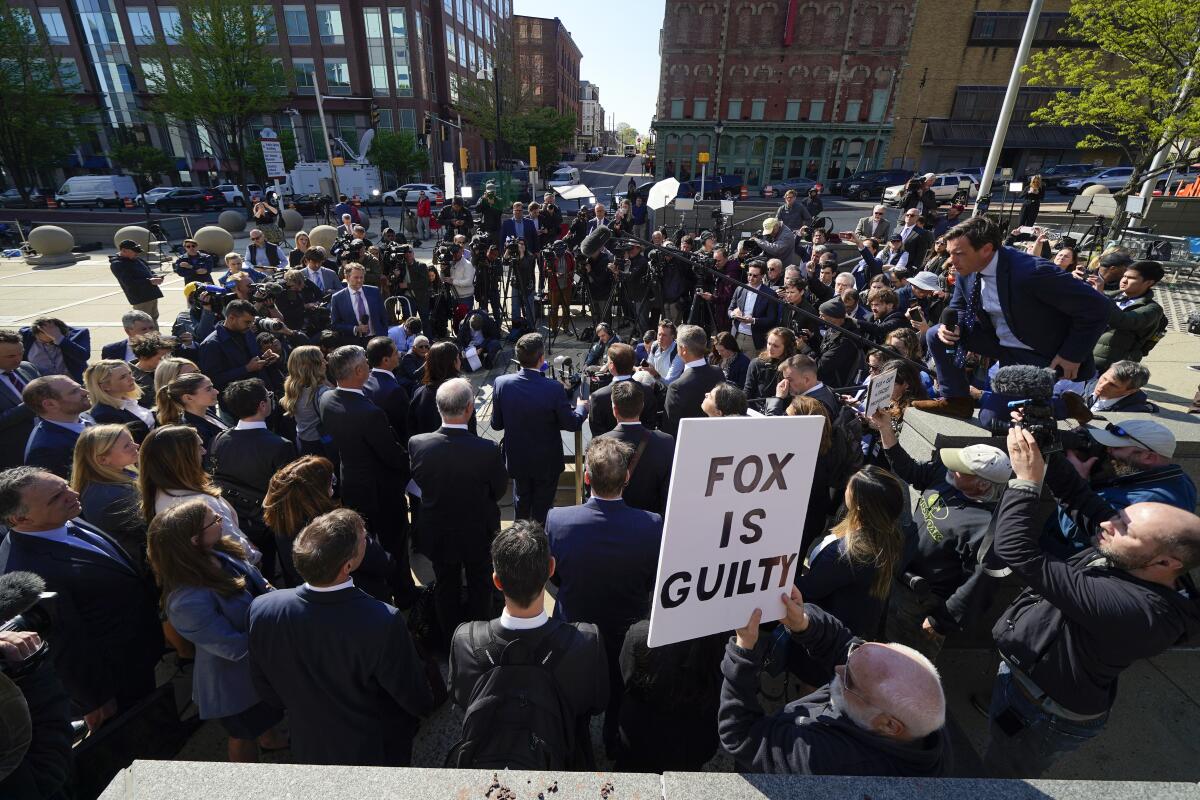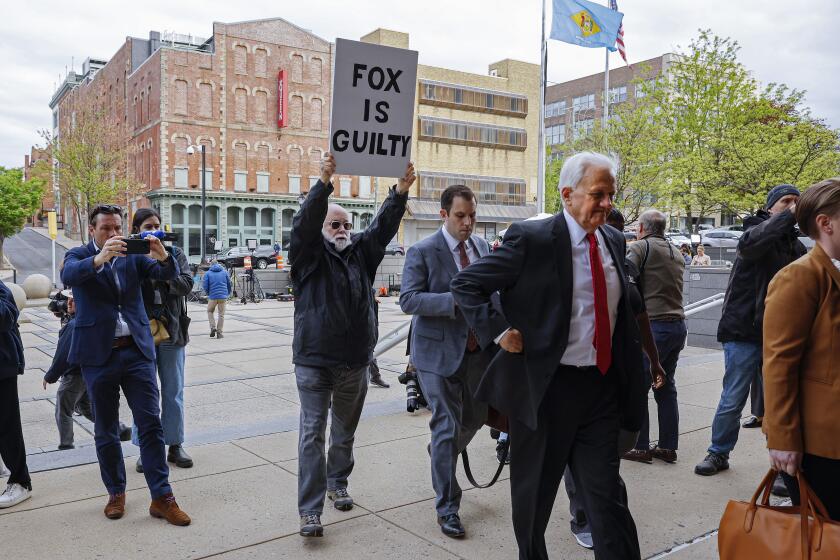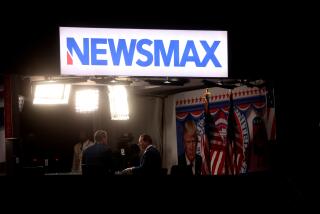Column: Fox News settled Dominion’s lawsuit for $787 million. Is the public left empty-handed?

Dominion Voting Systems’ defamation case against Fox News was settled for $787.5 million at the start of a trial Tuesday. Based on a series of sneak peeks at the damning evidence against Fox developed in pretrial discovery, the lucrative payout wasn’t surprising: The case Dominion was prepared to present was beyond devastating.
The outcome underscored the tension between the public value of litigation and the private interests driving a lawsuit. Dominion had a killer case against Fox that had many eagerly anticipating a measure of accountability for the network’s knowing support of the lie that Donald Trump won the 2020 election. But the company’s $1.6 billion claim for damages looked high. So the case was ripe for a settlement in which Fox paid a premium to avoid a debacle of a trial, serving the parties’ interests more than society’s.
Fox got off fairly lightly given the risks bearing down on it. By most accounts, it can absorb the settlement fairly easily. It’s a reasonable price to avoid the immense damage to its reputation — and consequently its bottom line — that an extended, detailed account of its knowing lies would have occasioned.
Even before the trial began Tuesday, it was clear that Fox had good reason to avoid it. Delaware Superior Court Judge Eric M. Davis had already ruled that broadcast claims that Dominion’s voting machines altered the results of the election were false, vaulting the company over the first hurdle defamation plaintiffs face.
That also would have given Dominion a formidable advantage on the question the parties would have contested at trial: whether Fox aired the statements at issue with “actual malice,” meaning it either knew they were false or recklessly disregarded the question. That’s because many of the statements, by Fox hosts and guests whose claims were presented as well-founded, are ridiculous on their face. The notion that Fox didn’t know they were false would strike any reasonable juror as far-fetched.
Rupert Murdoch’s Fox News avoids a potentially embarrassing trial with Dominion Voting Systems over its false reporting on allegations of 2020 election fraud.
If the trial had proceeded, the jury would have heard even more reasons to find actual malice — a lot more. Some of the most damning evidence consisted of behind-the-scenes emails and texts in which network stalwarts such as Tucker Carlson and Laura Ingraham admit that they know the Big Lie is just that. Even News Corp. Chairman Rupert Murdoch acknowledged that some of the network’s personalities had crossed a line. So it’s little wonder that Fox settled the case rather than let Murdoch and others take the stand.
The defenses the company had publicly advanced, moreover, were underwhelming. One was to argue that Dominion “cherry-picked” 20 or so ugly statements that distorted Fox’s generally defensible conduct. But the judge had rightly ruled that defamation must be analyzed statement by statement, rendering Fox’s other statements legally irrelevant. The jury’s attention would have been focused on the offending lies, not the less culpable conduct Fox wanted to highlight.
Fox’s other prominent defense was to wrap itself in the 1st Amendment, arguing that the case threatened “protections of the media’s absolute right to cover the news.” But there is no such right, and Fox’s claim was not only faulty but scurrilous. In the landmark press freedom case New York Times vs. Sullivan, which created the actual malice standard, the Supreme Court made it clear that the 1st Amendment exists to promote truthful reporting in support of an informed electorate. The only reason to tolerate false reporting in the absence of actual malice is to give the press breathing room to go after the facts aggressively without fear of liability for innocent mistakes.
Far from serving the goals of the 1st Amendment, Fox’s knowing and reckless publication of lies undermined press freedom and had a terribly corrosive effect on the country. Even settling for hundreds of millions probably saved the company money in the long run compared with the financial and reputational consequences of a train wreck of a trial.
Network stars and executives such as Tucker Carlson and Rupert Murdoch privately disparaged Donald Trump and doubted lies about Jan. 6 and the 2020 election.
Dominion had reason to settle too. While its case against Fox was as strong as that of any defamation plaintiff in memory, its claim for damages was less so given the company’s much smaller estimated net worth. Fox may have paid a premium in damages to avoid the sting of the trial and an unfavorable verdict.
Particularly in the face of consequential trials such as this one, the parties’ motivations — including those of the already exhausted legal teams — tend to realign in favor of settling. That’s especially true once serious talks begin.
A Dominion lawyer claimed in the aftermath that the settlement amounted to “a ringing endorsement for truth and democracy,” adding, “Truth has meaning. Lies have consequences.” And the company wasn’t alone in discerning a triumph of sorts against the Big Lie. But all Fox offered beyond the payout was to wanly “acknowledge the court’s rulings finding certain claims about Dominion to be false,” In the absence of any convincing contrition, Dominion’s claim of vindication seems likely to be quickly forgotten.
It was Fox’s mammoth checkbook, not any civic victory, that allowed it to make Dominion an offer it couldn’t refuse, satisfying the plaintiff’s interest regardless of the public’s. That’s an unavoidable consequence of an adversarial system based on the calculations of private parties.
The case did incidentally serve the public’s interest by exposing Fox and its personalities through discovery, but not nearly to the extent that it could have through a revealing and damaging trial. Much of the country was looking to Dominion to vindicate basic offenses against the body politic by Trump and his enablers. Now we have to look elsewhere.
Harry Litman is the host of the “Talking Feds” podcast. @harrylitman
More to Read
A cure for the common opinion
Get thought-provoking perspectives with our weekly newsletter.
You may occasionally receive promotional content from the Los Angeles Times.












